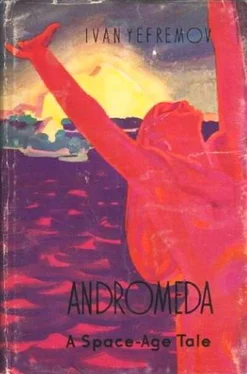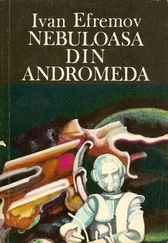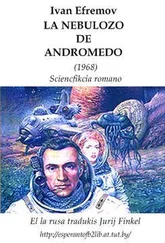Ivan Yefremov - Andromeda (A Space-Age Tale)
Здесь есть возможность читать онлайн «Ivan Yefremov - Andromeda (A Space-Age Tale)» весь текст электронной книги совершенно бесплатно (целиком полную версию без сокращений). В некоторых случаях можно слушать аудио, скачать через торрент в формате fb2 и присутствует краткое содержание. Город: Moscow, Год выпуска: 1959, Издательство: FOREIGN LANGUAGES PUBLISHING HOUSE, Жанр: Фантастика и фэнтези, на английском языке. Описание произведения, (предисловие) а так же отзывы посетителей доступны на портале библиотеки ЛибКат.
- Название:Andromeda (A Space-Age Tale)
- Автор:
- Издательство:FOREIGN LANGUAGES PUBLISHING HOUSE
- Жанр:
- Год:1959
- Город:Moscow
- ISBN:нет данных
- Рейтинг книги:5 / 5. Голосов: 1
-
Избранное:Добавить в избранное
- Отзывы:
-
Ваша оценка:
- 100
- 1
- 2
- 3
- 4
- 5
Andromeda (A Space-Age Tale): краткое содержание, описание и аннотация
Предлагаем к чтению аннотацию, описание, краткое содержание или предисловие (зависит от того, что написал сам автор книги «Andromeda (A Space-Age Tale)»). Если вы не нашли необходимую информацию о книге — напишите в комментариях, мы постараемся отыскать её.
Andromeda (A Space-Age Tale) — читать онлайн бесплатно полную книгу (весь текст) целиком
Ниже представлен текст книги, разбитый по страницам. Система сохранения места последней прочитанной страницы, позволяет с удобством читать онлайн бесплатно книгу «Andromeda (A Space-Age Tale)», без необходимости каждый раз заново искать на чём Вы остановились. Поставьте закладку, и сможете в любой момент перейти на страницу, на которой закончили чтение.
Интервал:
Закладка:
“We usually announce new proposals ourselves,” continued Mir Ohm, “but today you will hear an almost finished piece of research. Its author, Eva Djann, will give you material that will require most careful thought.”
The Secretary laid aside a metal sheet and smiled in a friendly way. At the end of the row of seats nearest to the rostrum Mven Mass appeared; in his dark-red costume he looked at once gloomy, solemn and calm. As a sign of respect for the assembly he raised his folded hands above his head and then sat down.
Mir Ohm left the rostrum to make way for a young woman with short, golden hair and green eyes that had a look of permanent surprise in them. Grom Orme, the President of the Council, stood beside her.
Eva Djann began speaking in a suppressed voice and was so shy that she seemed afraid to make the slightest movement. She started from the well-known fact that southern vegetation is distinguished by its blue foliage. This is a colour that is typical of ancient forms of vegetable life on Earth. An investigation of plant life on other planets had shown that blue foliage belongs to an atmosphere that is either more transparent than that of Earth or to one that is subjected to greater ultra-violet radiation from its luminary than Earth is from the Sun. It had long been known, she said, that the Sun, whose red radiation is stable, shows great instability at the blue and ultraviolet end of the spectrum. About two million years earlier there had been a sharp change in the Sun’s ultraviolet radiation that had continued over a lengthy period. It was then that the blue foliage appeared, the birds and beasts of the open spaces acquired black protective covering and birds that nested in the open began laying blade eggs.
At this time Earth’s axis lost its stability owing to changes in the electromagnetic regime of the solar system. For a long time astronomers had based their calculations on the mechanics of gravitation alone and had paid no attention to electromagnetic equilibrium which is much more changeable than gravitation.
There had long been in existence schemes for the transfer of seas into depressions on the continents in order to bring about a shift of Earth’s axis. If this problem be approached from the standpoint of the electromagnetic forces of the system and not as a problem in elementary mechanics it would be more easily and cheaply achievable. It would be remembered, she continued, that in the early days of space travel the creation of artificial gravitation had required such a tremendous expenditure of power that it had been practically impossible. Since the discovery of meson forces, however, our spaceships had been equipped with simple and reliable artificial gravity installations. And Renn Bose’s experiment had indicated a way of by-passing gravitation.
Eva Djann stopped. A group of six people, the heroes of the Pluto Expedition, seated in the centre of the hall, applauded her by extending their folded hands. The young woman’s cheeks flushed for a moment before the screen lit up with the phantom contours of stereometric drawings.
“I realize that the problem is one that can be developed on a wider scale and that we can then think of changing the orbits of planets and bringing Pluto nearer to the Sun. But so far I have in mind only the shifting of the planet’s axis of rotation to improve climatic conditions on the continental hemisphere. Renn Bose’s experiment showed the possibility of the inversion of the gravitational field in its second aspect, that is, in the aspect of the electromagnetic field, with subsequent vectoral polarization in these directions,” she pointed to geometric figures on the screen that had become elongated and were rotating, “Earth’s axis of rotation would lose its stability and the planet could be turned in the desired direction for the better illumination of the continents.”
Rows of parameters that had been computed by machines beforehand now appeared on the long glass under the screen and everybody who could understand them saw that Eva Djann’s project was, at any rate, not without sound foundation.
Eva Djann stopped the movement of the drawings and symbols and, her head bowed, left the rostrum. Her audience exchanged glances and whispered amongst themselves. The young commander of the Pluto Expedition, exchanging a scarcely perceptible glance with Grom Orme, mounted the rostrum.
“There is no doubt that Renn Bose’s experiment will have a trigger action and set off a chain of important discoveries. It seems to me to be leading us to distant vistas of science that were formerly unattainable. It was the same way with the quantum theory — the first approach to an understanding of the repagulum or mutual transition with the subsequent discovery of the antiparticle and the antifield. Then came the repagular calculus that scored a victory over the principle of indefiniteness proposed by the ancient mathematician Geisenberg. And, lastly, Renn Bose made the next step, the analysis of the space-field system, leading to an understanding of antigravitation and antispace, or, by the repagulum law, to zero space. All the formerly unaccepted theories have, in the long run, become the foundations of science!
“In the name of the Pluto exploration group I propose transmitting the problem over the universal information network for general discussion. The inclination of Earth’s axis would reduce the expenditure of energy for the warming of the polar regions, would smooth out the polar fronts and increase the planet’s water supply.”
“Is the question now being submitted to the vote clear to everybody?” asked Grom Orme.
A large number of green lights flashed up in answer to the question.
“All right, we’ll begin,” said the President and pushed his hand under the book-rack in front of his seat. There were three buttons there connected with a calculating machine, the one on the right signalled “yes,” the middle one, “no” and the one on the left “abstain.” Every member of the Council sent a signal which the others could not see. Evda Nahl and Chara also pressed buttons working a separate machine which counted the votes of the audience to control the correctness of the Council’s decision.
A few seconds later large symbols appeared on the demonstration screen — the problem had been accepted for discussion by the whole planet.
Grom Orme took the floor.
“For a reason that I shall not disclose until the case is over, we shall now examine the action of Mven Mass, the former Director of the Outer Stations of the Astronautical Council and will then decide the question of the 38th Cosmic Expedition. Does the Council believe that I have sufficient motives for my request?”
Green lights signalled unanimous consent.
“Does everybody know the details of what happened?”
Again a flash of green lights.
“That will speed up our business! I will ask Mven Mass, the former Director, to outline his motives for an action that had such dire results. The physicist, Renn Bose, has not yet sufficiently recovered from his injuries and has not been sent for as a witness. He is not answerable for the experiment.”
Grom Orme noticed a red light burning at Evda Nahl’s seat.
“Attention everybody! Evda Nahl wants to make an additional statement about Renn Bose.”
“I would like to speak in his place.”
“What are your motives?”
“I love him!”
“You may speak after Mven Mass.”
Evda Nahl extinguished the red light and sat down.
Mven Mass appeared on the rostrum. Calmly, in no way excusing himself, he told of the results that were expected from the experiment, related what had actually happened and the vision in which he did not quite believe. Their foolish hurry in carrying out the experiment on account of the secretiveness and illegality of their action, left them no time to devise special recording machines, they had relied on the usual memory machines and they had been destroyed in the first instant. Another mistake had been the conduct of the experiment through the satellite. They ought to have attached an old planetship to Satellite 57 and set up instruments on it to orientate the vector. He, Mven Mass, was guilty in all respects. Renn Bose made the arrangements for the ground installations but the transmission of the experiment into the Cosmos was exclusively the competency of the Director of the Outer Stations.
Читать дальшеИнтервал:
Закладка:
Похожие книги на «Andromeda (A Space-Age Tale)»
Представляем Вашему вниманию похожие книги на «Andromeda (A Space-Age Tale)» списком для выбора. Мы отобрали схожую по названию и смыслу литературу в надежде предоставить читателям больше вариантов отыскать новые, интересные, ещё непрочитанные произведения.
Обсуждение, отзывы о книге «Andromeda (A Space-Age Tale)» и просто собственные мнения читателей. Оставьте ваши комментарии, напишите, что Вы думаете о произведении, его смысле или главных героях. Укажите что конкретно понравилось, а что нет, и почему Вы так считаете.











